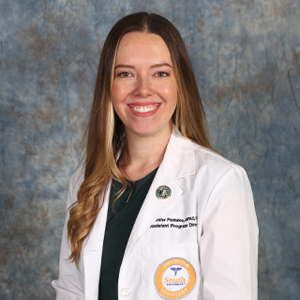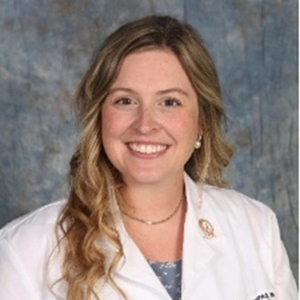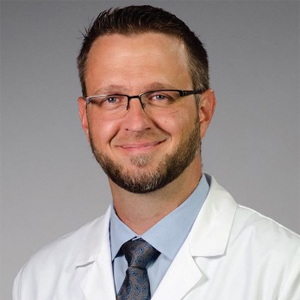Physician Assistant

Master of Science in Physician Assistant

South University’s Master of Science in Physician Assistant prepares students to pursue becoming physician assistants through coursework that offer fundamental medical concepts and theories, provides students with the knowledge, skills and attitudes necessary to function, with physician supervision, as medical professionals who will serve as valued members of the health care team. Physician assistants are medical professionals who diagnose illness, develop and manage treatment plans, prescribe medications, and often serve as a patient’s principal healthcare provider. The Physician Assistant program is designed to provide students with effective learning opportunities that will prepare them to perform their expected competencies in an ethical, legal, safe, and effective manner as students learn how to pursue becoming a physician assistant. Physician assistants perform medical functions that include, but are not limited to, evaluation, monitoring, diagnostics, therapeutics, counseling, and referral. The scope of the practice varies according to state laws, the medical setting, and the training of the physician assistant. In many states, physician assistants can prescribe and/or dispense medicine.
South University Physician Assistant Program graduates are eligible to pursue national certification by sitting for the Physician Assistant National Certifying Exam (PANCE) developed by the National Commission on Certification of Physician Assistants (NCCPA). Please see the Professional Licensure Disclosure in the South University Academic Catalog for the determinations if our program meets the professional licensure requirements in your state of residence.
South University does not guarantee third-party certification/licensure. Outside agencies control the requirements for taking and passing certification/licensing exams and are subject to change without notice to South University. Students must pass the certification exam and obtain professional state licensure to work in their respective field.
South University cannot guarantee each graduate will pass the required licensure examinations. Outside agencies control the requirements for taking and passing certification/licensing exams and are subject to change without notice to South University.
*South University does not promise or guarantee licensure, employment, or salary amounts.
Meet the Tampa PA Team!
Accreditation Review Commission on Education for Physician Assistant
The Accreditation Review Commission on Education for the Physician Assistant (ARC-PA) has granted Accreditation Continued to the South University Physician Assistant Program, Tampa, Florida sponsored by South University, Tampa, Florida. Continued accreditation is an accreditation status granted when a currently accredited program is in compliance with the ARC-PA standards.
Accreditation remains in effect until the program closes or withdraws from the accreditation process or until accreditation is withdrawn for failure to comply with the standards. The approximate date for the next comprehensive review of the program by the ARC-PA will be March 2027. The program's accreditation history can be viewed on the ARC-PA website at:
https://www.arc-pa.org/wp-content/uploads/2025/06/Accreditation-History-South-Univ-Tampa-130.pdf
Accreditation Review Commission on Education for the Physician Assistant, Inc., 12000 Findley Road, Suite 275, Johns Creek, GA, 30097; Telephone: 770.476.1224
Admissions Requirements
Procedure for Admission to the Master in Science Physician Assistant (MSPA) Program
Entrance to the Master of Science in Physician Assistant (MSPA) program is gained through a formal application review and an interview. Application to the program is made through the Central Application Service for Physician Assistants (CASPA). Applicants must specifically designate the South University campus(es) to which their application should be submitted within the CASPA system.
A completed application must be submitted through CASPA in order to be reviewed by any of the South University campuses. The application cycle for the January start will begin in April annually. The deadline for all application materials to be complete* in the CASPA application portal is August 1st annually.
To apply for the Master of Science in Physician Assistant degree program at South University, Tampa, individuals must:
- Complete CASPA online Applications including submission of all transcripts and GRE scores.
- Official GRE scores for the General Test (verbal, quantitative, and written essay) are required to be electronically submitted to CASPA through ETS (Educational Testing Service) using the Tampa program GRE Code: 0454. Paper copies are not accepted.
*This is the date your application became complete and was placed in the verification queue. Your complete date is the day your final required item - a transcript, reference letter, payment, or e-submitted application - posted to your CASPA account.
**Please do not send transcripts directly to South University. Transcripts should be sent to CASPA.
Individuals whose applications are deemed competitive will be invited for a required interview. Therefore, those who apply early in the admission cycle are more likely to be granted an interview than those who apply later. Each program concludes interviews for the admissions cycle upon filling all available seats. Not all qualified applicants will receive an interview.
Students who are offered a seat in the Physician Assistant program are only permitted to reserve a seat at one campus. Within 14 days of the applicant signing and submitting the acceptance form, it is the responsibility of the applicant to notify any other South University Physician Assistant program(s) of his/her intent to withdraw. Seat acceptance fees are non-transferable to other South University programs.
Note: Applicants should refer to the Physician Assistant Program policy on Acceptance Fee for more details.
Admission Criteria
Selection for the Master of Science in Physician Assistant program is highly competitive. Meeting the minimum requirements does not guarantee an interview or admission. Successful applicants will generally exceed the minimum criteria. The following criteria represent the minimum conditions established for students interested in applying to the South University Master of Science in Physician Assistant degree program:
- Applicants must have an earned bachelor’s degree from a regionally accredited U.S. institution no later than August 1st of the year they apply.
- Applicants must have an overall GPA as calculated by the CASPA service of 3.0 or greater (on a 4.0 scale) (including undergraduate, post-baccalaureate, and graduate coursework).
- Applicants should have a Biology-Chemistry-Physics (BCP) science GPA of 3.0 (on a 4.0 scale) as calculated by the CASPA service.
- Applicants must submit scores from the GRE general exam directly to the CASPA service using the South University PA program code 0454.
- At least three letters of reference on the CASPA application must be submitted
- At least one reference on the CASPA application must be from a physician (MD/DO), Physician Assistant, or Nurse Practitioner with whom the applicant has worked or shadowed and to whom the applicant is not related. Impressive, well- articulated, and unequivocal letters attesting to the applicant’s motivation, communication and interpersonal skills, professionalism, and future contribution towards health care are considered competitive.
Clinical Experience
Clinical experiences should provide the applicant with a knowledge of and orientation to the presentation, signs, and symptoms of a variety of ill or injured patients. Although clinical experience is not required, preference is given to applicants who have direct patient care experience (i.e., care that involves personal interaction with patients such as: physical therapist, respiratory therapist, emergency medical technician/paramedic, nurse, medical assistant, or certified nursing assistant, or other similar professions). However, there is no requirement for a predetermined number of hours (or months) of healthcare experience to be earned by an applicant.
Admissions Committee Selection Factors
Applicants for admission are considered and ranked using multiple factors. Applicants are awarded preference points based upon the following selection factors:
Academic achievement (overall GPA, BCP, GRE).
- Preference will be given to those with an overall GPA at or above 3.4.
- Preference will be given to those with a prerequisite Biology-Chemistry-Physics (BCP) GPA at or above 3.2 (on a 4.0 scale) as calculated by the CASPA service.
- Preference will be given to those with GRE scores (Quantitative and Verbal Reasoning) at the 50th percentile or above.
Quality of letters of reference from medical providers (e.g., MD, DO, NP, PA).
- References from Physician Assistants (PAs) are preferred.
Clinical experience that requires direct patient care.
- Preference is given to applicants with clinical experience that requires direct patient care, such as: physical therapist, respiratory therapist, emergency medical technician (EMT)/paramedic, nurse, medical assistant, or certified nursing assistant (CNA).
Personal statement/essay.
Healthcare provider mentorship/shadowing experiences.
Community service.
Interview performance.
The Admissions Committee assesses evidence of an applicant’s interpersonal skills, problem-solving ability, professionalism, motivation, academic potential, communication, knowledge of the PA profession and the healthcare system with an alignment to the mission and vision of the program. The Master of Science in Physician Assistant Program adheres to the South University Non-discrimination policy.
Post-Acceptance Requirements
Accepted applicants will be required to complete the following items in order to obtain approval for matriculation in January:
- Satisfactory Criminal Background and Drug Screen Report
- Health/Immunization Requirements
- Health Insurance Documentation
- Baccalaureate Diploma Verification
- American Heart Association (AHA) Approved Basic Life Support (BLS) Certification
- FAFSA application (Free Application for Federal Student Aid) submission for those applying for financial aid
Applicants seeking admission to the Physician Assistant program must abide by the College of Health Professions Background Check Policy and Substance Abuse and Screening Policy. Acceptance into a South University program or its completion does not guarantee that a student will be able to obtain subsequent licensure or certification.
All Physician Assistant program students are responsible for meeting matriculation deadlines and requirements as published within the campus-specific Enrollment Guide. There is a non-refundable $1000 acceptance fee for those applicants accepted into the Physician Assistant programs at South University, Tampa. Acceptance fees are applied towards tuition.
If you have questions in regard to the application process, please call the Tampa Physician Assistant Program office at (813)-393-3720 or contact via email at kblizzard@southuniversity.edu.
Prerequisites
Prerequisite Courses
Applicants must complete all prerequisite courses listed below with a grade of C or better at a regionally accredited U.S. college or university prior to submission of his/her application. The PA program accepts prerequisite coursework completed in an online, virtual, or on-ground format from a regionally accredited U.S. college or university.
PREREQUISITE | DURATION | |
Required | Anatomy and Physiology | 2 courses (sequenced)
OR
No course substitutions are accepted for this requirement. |
General Biology | 2 courses Required:
Alternative Substitution for Biology II ONLY:
| |
General Chemistry and Labs | 2 courses Required:
| |
Microbiology with Lab | 1 course No course substitutions are accepted for this requirement. | |
Organic Chemistry or Biochemistry | 1 course Lab recommended, not required. |
In general, prerequisite coursework with titles that include "Essentials of," "Survey of," or "Introductory to," unless specifically designed for science majors, are considered less competitive.
Basic science courses should be those for science majors. The General Biology and Biochemistry courses are recommended to include a lab, but it is not required.
Only courses (excluding General Biology, Biochemistry, and Organic Chemistry) with an associated lab will be given credit for fulfilling prerequisite requirements. In the event that a laboratory is not offered with a prerequisite course, applicants may request the lab requirement for that course be waived by contacting the program. Lab waivers and/or course substitutions are granted at the discretion of the Admissions Committee. Applicants requesting such should be prepared to submit supporting documents, including, but not limited to, course descriptions.
The South University Master of Science in Physician Assistant program accepts credit for Advanced Placement (AP) courses. AP courses taken and successfully completed will be counted as one course credit towards completion of the respective prerequisite subject. Grades earned in AP courses are not used in the calculation of the applicant's overall or prerequisite GPA.
The South University Master of Science in Physician Assistant program does not accept College Level Examination Program (CLEP) credit for any prerequisite requirements.
South University Master of Science in Physician Assistant programs do not accept a transfer of credits from other physician assistant programs or provide enrolled students with a waiver of credit (i.e., advanced placement) for any component of the required curricular coursework. All students must complete each course in the South University Master of Science in Physician Assistant curriculum.
Admissions Calendar
Annual Admissions Cycle
April
CASPA begins accepting applications for the following year matriculation.
June - October
Admissions Interviews.
August 1
Application deadline for which application must be in “Complete” status with CASPA for consideration of matriculation the following January.
January
Classes begin.
Curriculum
The South University Physician Assistant Program, located in Austin, Richmond, Savannah, Tampa, and West Palm Beach, delivers the didactic curriculum as a full-time, primarily on-campus experience with some blended instruction that may include virtual, synchronous modalities. As a complement to the on-campus didactic curriculum, clinical subject matter experts are included to ensure students are provided with current standards of medical practice. The clinical curriculum and clinical rotations are primarily direct patient care experiences with blended telehealth/telemedicine opportunities.
Didactic Phase Total: 100 Credits
Clinical Phase Total: 74
The courses below are offered on an as needed basis:
No physician assistant credits from another institution may transfer into the didactic or clinical phase. Master of Science in Physician Assistant students must complete the entire 27-month program (174 credit hours) at South University.
Program Goals
The following are program goals for the South University, Tampa Master of Science in Physician Assistant program:
1. The program will promote advocacy and leadership within the PA profession.
2. The program will prepare graduates to achieve a first-time pass rate on the Physician Assistant National Certification Examination (PANCE) that equals or exceeds the national average.
3. The program will offer community service and outreach opportunities that promote a commitment to improving access to quality healthcare.
Please click HERE for information on our Physician Assistant program and effectiveness in achieving program goals.
(Note: Requirements for NCCPA Certification are determined by the NCCPA and are subject to change without notification to South University. Graduation from the South University, Tampa Physician Assistant program does not guarantee certification or employment.)
PANCE Certification and Attrition
Graduates of an accredited Physician Assistant program must pass the national Physician Assistant National Certifying Exam (PANCE) in order to acquire state licensure to practice. This exam is developed jointly by the National Board of Medical Examiners and the National Commission on Certification of Physician Assistants (NCCPA). Below are the percentage pass rates for the first-time test takers of the PANCE for the past five South University, Tampa Master of Science in Physician Assistant Studies (MSPA) graduating classes.
Click the link below to view the pass rates of South University, Tampa students
View PANCE pass rates of South University, Tampa students.
Student Attrition
To view the South University, Tampa MSPA program student attrition information, please click HERE.
Tuition and Fees
Estimated Tuition for the Master of Science in Physician Assistant (MSPA) Degree
Per quarter: $10,856.00
Total tuition: $97,704.00
Required Fees for the MSPA Degree
Acceptance Fee: $1,000.00 (Non-refundable/Applied to Tuition)
Registration Fees: $225.00 ($25.00 per term)
Graduation Fee: $250.00
Textbooks: $2,610.00 ($15 per credit hour)
Technology Fee: $3,480.00 ($20 per credit hour)
Clinical Experience Fee: $9,000.00 ($1000.00 per quarter)
Other Estimated Costs for the MSPA Degree
(South University will not charge for these costs. They are the student's responsibility.)
American Academy of Physician Assistant (AAPA) Student Membership Fee: $75.00 (One-time Fee)
Professional Instruments: $1,100.00 (Approximate)
Surgical Scrubs: $55.00 (Approximate)
Laptop Computer and privacy screen: $1,500.00 (Approximate)
Background Check: $800.00 (Additional fees may apply to the base package fee contingent upon credentialing requirements of the hospital.) (Approximate)
State Association Fees: $60.00 (Approximate, can vary by state)
American Heart Association approved BLS: $100.00
Estimated Total for the MSPA Degree
Tuition and Fees: $116,959.00
Tuition and fees are subject to change. The tuition for in-state and out-of-state residents is the same. Acceptance fee is non-refundable and upon acceptance is applied toward the student’s tuition. If a student decides not to attend after accepting, the fee will not be refunded.
All students are required to have a laptop computer with wireless internet access for use in the multimedia classroom. Purchase of these items is not recommended prior to acceptance into the program because of these very specific requirements.
Inclusive in Tuition, Technology, and Digital Resources
Students obtain access to the following digital platforms:
- Lecturio, Rosh Review, Up-To-Date
- AccessMedicine, AccessPharmacy, AccessAnesthesiology, Case Files Collection
- Complete Anatomy 3D4, My EKG Lab
- Butterfly Ultrasound Technology
- PANCE Board Review in person sessions and digital test bank questions
- CORE clinical logging and portfolio resources
- PAEA End of Rotation Exams, End of Curriculum Exams, PACKRAT1 and PACKRAT2
- PAVMT (PAs in Virtual Medicine and Telemedicine) up-to-date medical technology trends
- LinkedIn Learning
- Bright Space Learning Management System
- ExamSoft Testing platform
Clinical Experience Fee and Additional Clinical Expenses:
Clinical Experience Fees support the recruitment of clinical sites across the nation, strengthen the quality of the learning experience, and subsidize the increasing costs of clinical sites. Students may be scheduled for rotations outside the local campus geographical area.
All students should plan to travel/commute for some clinical rotations. Students are given the opportunity to share their scheduling preferences during their pre-clinical meetings. This will provide the Clinical Education Team with information which may have a bearing on their rotation assignments. Students are responsible for their credentialing, transportation, housing, and living expenses during their clinical year. Expenses will vary depending on the location of each rotation site.
Payment of Tuition and Fees
All charges are due and payable on or before the registration date for each quarter. Circumstances which prevent a student from adhering to these dates should be discussed with the financial aid office. Students attending school under grants and/or loans should confer with the financial aid office concerning payment of fees. Students attending school under the G.I. Bill may discuss payment of school fees with the Director of Financial Aid. Failure to make proper payments, unless otherwise cleared by the financial aid office, will result in dismissal from the university. Grades will not be issued, degrees granted, or academic transcripts furnished until all financial obligations have been satisfied and all university property returned. For refund policies, please see the academic catalog HERE.
Policies and procedures for student withdrawal, refunds of tuition and fees, policies that limit or prevent students from working during the program and policies and procedures for processing student grievances can be found in the South University catalog.
Student Handbook and Employment
For the South University, Tampa Master of Science in Physician Assistant (MSPA) program Student Handbook please click HERE. All Physician Assistant program policies apply to all students, principal faculty, and the program director regardless of location, i.e., didactic and clinical settings.Student Employment
Due to the rigorous nature of the Physician Assistant program, employment during a student's course of training is strongly discouraged.
Employment must never interfere with academic or clinical assignments.
At no time is a South University Physician Assistant student allowed to or required to work for the South University Physician Assistant program or program clinical sites.
Physician Assistant at South University
South University is committed to creating career opportunities for our students, so we provide the relevant coursework for you to meet your career goals in a position as a Physician Assistant as well as the ethical and legal competencies and effective communication skills that are integral for this profession. In addition, we instill the value of continued education in our students so you can continue to create more opportunities for success in your career.
Mission and Vision
Physician Assistant Program
Mission Statement
The mission of the South University Physician Assistant (MSPA) is to educate a diverse student population and prepare graduates to practice the art and science of medicine while providing high-quality, equitable, and inclusive patient-centered healthcare.
Vision Statement
The South University Master of Science in Physician Assistant (MSPA) degree program strives to provide an educational environment that empowers students to practice evidence-based, patient-centered medical care. With an emphasis on increasing access to care, reducing health disparities, and engaging in community outreach, we aim to provide inclusive educational experiences for students, faculty, and staff. As future clinical leaders, the program’s focus is to graduate physician assistants who will promote cultural humility and patient advocacy.
Technical Standards
In order to ensure that patients receive the best medical care possible, the faculty of the South University Physician Assistant program has identified certain skills and professional behaviors that are essential for successful progression of physician assistant students in the program. A student must possess skills and behaviors at a level of capability to perform a variety of duties required of a physician assistant as a health care professional.
Students with disabilities who can perform these skills and successfully execute professional behavior either unassisted, with dependable use of assistive devices, or by employing other reasonable accommodations are eligible to apply for enrollment in the program. Minimum performance standards include critical thinking, communication skills, observation skills, motor skills, and interpersonal abilities. Interested parties may contact the Physician Assistant program office for additional information about South University performance standards. These skills and behaviors include, but are not limited to;
Critical Thinking: A student must possess the intellectual, ethical, physical and emotional capabilities required to undertake the full curriculum and to achieve the levels of competence required by the faculty. The ability to solve problems, a skill that is critical to the practice of medicine, requires the intellectual abilities of measurement, calculation, reasoning, analysis and synthesis. Students must be able to perform demonstrations and experiments in the basic sciences.
Communication Skills: A student should also be able to speak, to hear, and to observe patients in order to elicit information, describe changes in mood, activity and posture, and to perceive nonverbal communications. The student must be able to communicate effectively and efficiently in oral and written forms.
Observation Skills: The student must be able to observe a patient accurately, both at a distance and in close proximity. This ability requires the functional use of vision and somatic sensation.
Motor Skills: A student should have sufficient motor function to elicit information from patients by palpation, auscultation, percussion and other diagnostic techniques. A student should be able to execute movements reasonably required to move from area to area, maneuver in small spaces, calibrate and use large and small equipment, position and move patients, and provide patients with general care and emergency treatment.
Interpersonal Abilities: A student for the Physician Assistant program must possess the emotional health required for full utilization of his or her intellectual abilities, the exercise of good judgment, the prompt completion of all responsibilities required for the diagnosis and care of patients and the development of professionalism through mature, sensitive, and effective relationships with patients, families, and colleagues.
Clinical Rotations
12 months
The clinical phase is 12 months in length. Eight five-week clinical rotations are conducted at a variety of clinical sites. Students will gain clinical exposure in the following disciplines: Family Medicine, Internal Medicine, General Surgery, Pediatrics, Women's Health, Behavioral Medicine, Emergency Medicine and the Clinical Elective.
Clinical sites are recruited by the Program’s Clinical Department and personnel from the Area Health Education Center (AHEC). Sites offer the students the wide variety of clinical experiences for that specific clinical rotation (course) and service delivery system. Students are not required to supply their own clinical sites or preceptors for clinical rotations. Sites for rotations will be determined by the department. Alternate rotation sites may be provided by the student to the Clinical Department personnel. Clinical Department personnel will evaluate sites suggested by students for viability as a clinical rotation site. In order to qualify for rotations outside of South University sites, or in student suggested sites, a student must demonstrate successful academic, clinical, and professional progress in the program.
The South University Master of Science in Physician Assistant program immunization policy is aligned with the US Centers for Disease Control and Prevention’s Healthcare Personnel Vaccination Recommendations for health professionals. After acceptance into the program, but before registration can be successfully completed, all students must complete the South University Health Requirements. Be aware that additional immunizations may be required by some clinical training sites and are the students’ responsibility. If students choose not to be vaccinated, they will not be allowed to rotate at clinical sites that require immunizations unless expressly permitted in writing to the program by the appropriate personnel at that site. If any of the core (required) rotations cannot be completed because the student voluntarily chose not to be vaccinated as required by the clinical rotation site, the student will not be eligible for graduation from the Physician Assistant program. In addition, if the number of clinical sites available to students who have not been vaccinated does not meet graduation requirements, those students will not be eligible for graduation from the Master of Science in Physician Assistant program.Physicians, physician assistants, and other health care providers serve as preceptors for clinical students in direct patient care, providing the opportunity for the student to perfect technical and procedural skills, and to become competent in communication, physical diagnosis, succinct recording and reporting, problem assessment, and development of a logical approach to further studies and therapy.
Our students rotate in busy clinics, private physician offices, teaching hospitals, large institutions, and military hospitals and clinics. Rotations exist both in small towns and metropolitan cities. Our students are offered a wide variety of experiences and locations for their clinical rotations that are designed to round out the application of knowledge and skills to actual patient care.Outcomes
Learning Outcomes
The following are the program learning outcomes (Graduate Competencies) for the South University Master of Science in Physician Assistant program. Prior to graduation from the program, students will:
- PLO-1. Integrate behavioral, social, and medical knowledge established from the evolving biomedical and clinical sciences in recognizing, evaluating, and managing patient disease states across the lifespan during acute, chronic, preventative, and emergent encounters.
- PLO-2. Demonstrate the interpersonal and communication skills required to sustain effective, multi-directional information exchange within a diverse population of patients, their caregivers, and members of the healthcare team.
- PLO-3. Demonstrate the ability to elicit an accurate patient history, perform an appropriate physical examination, and perform appropriate clinical procedures using essential clinical and technical skills to provide quality patient care.
- PLO-4. Collaborate effectively as part of an interdisciplinary healthcare team through clinical reasoning and problem-solving skills to formulate a logical differential diagnosis, select and interpret appropriate diagnostic studies, and synthesize a comprehensive, patient-centered management plan for the promotion of wellness and disease prevention.
- PLO-5. Demonstrate the ability to interpret and integrate an evidence-based approach to clinical and professional practice through clinical reasoning, problem- solving, and decision-making processes to improve patient care practices.
- PLO-6. Demonstrate professionalism through personal behaviors, sensitivity, and accountability essential to patients, society, and the profession.
Career Outlook
When you have completed your degree program, you will be able to work* as a Physician Assistant in a variety of settings.
*Graduates are required to pass the national certification exam and obtain a state license in order to work in the field. (Exam names vary by program.) Please refer to the State Professional Licensure Determination and National Certification/Licensure section of the University catalog for additional information. South University cannot guarantee each graduate will pass the required licensure examinations. South University does not promise or guarantee licensure, employment or salary amounts.
Physician Assistant Faculty
Meet the Team!

Karen Wilcox, DMSc, PA-C
Assistant Dean – College of Health Professions Graduate Programs, Assistant Professor

Elliot E. Cazes, MD
Medical Director

Jennifer Pantaleo, MPAS, PA-C
Program Director, Assistant Professor

Diane Butler, MBA, MCMS, PA-C
Assistant Program Director, Assistant Professor

Lauren Lieb, DMSc, MPAS, PA-C
Director of Didactic Education, Assistant Professor

Jaime Rodriquez, MMS, PA-C
Assistant Director of Didactic Education, Assistant Professor

Ciara Calitri, MPAS, PA-C
Director of Clinical Education, Assistant Professor

Brian McComb, MPAS, PA-C
Assistant Director of Clinical Education, Assistant Professor

Mike Rees, MSPA, PA-C
Chair of Admissions, Assistant Professor

Brandon Hensley, MPAS, PA-C
Assistant Professor

Ronda Hanneman, MPH, PA-C
Associate Professor

Kaitlyn Blizzard, MBA
Admissions Representative

Wendy Nguyen
Education Clinical Coordinator

Alissa T. Fox
Program Coordinator
What's New
Latest News and Blogs

Dec 17, 2025
IT Alumni Spotlight: Growing a Career at Toyota
Find out how IT program graduate and current MBA student DaMarcus Sullivan is applying what he learned at South University to his career at Toyota.

Nov 18, 2025
MBA vs MPA: What’s Better for You?
Learn the differences between the MBA and MPA degree programs and figure out which degree helps you pursue your goals.

Oct 08, 2025
Business Alumni Spotlight: A Leader in Senior Care
DBA graduate B. Christian Randolph holds four degrees from South University that have helped her launch and grow her senior care business.

Aug 26, 2025
How to Know if It’s Time for a Career Change
If you're thinking of changing careers, here are some tips to see if the time is right to make a switch.

May 29, 2024
Alumni Spotlight: MBA Grad Becomes Fashion Leader
Discover how Alumni Rose Gordon has made a name for herself in the fashion industry.

Mar 26, 2024
How to Create and Lead a Strong Team
Learn tips for building and maintaining a team and fostering healthy collaboration and success.
Fill out the form and a representative will contact you today to better understand your academic goals plus answer any questions you may have.
Campuses offer flexible learning formats* including: on-campus, virtual instructions, and online courses.
*Clinical, practicum, and externship requirements exist in certain programs and require field experiences. Learning formats may not be flexible.
Success! Your request was submitted. We'll be in touch soon!
In the meantime, you can view some of our FAQs.
If you want to talk to an admissions representative ASAP, please contact us at (888) 444-3404.
Outstanding Education for Remarkable Careers
We're committed to helping our graduates make an impact in their professional and personal lives. We applaud our alumni and the difference they make. Check out what some of our healthcare graduates have to say.






